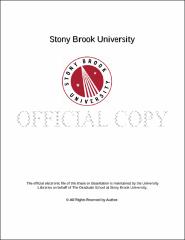| dc.identifier.uri | http://hdl.handle.net/11401/76632 | |
| dc.description.sponsorship | This work is sponsored by the Stony Brook University Graduate School in compliance with the requirements for completion of degree. | en_US |
| dc.format | Monograph | |
| dc.format.medium | Electronic Resource | en_US |
| dc.language.iso | en_US | |
| dc.publisher | The Graduate School, Stony Brook University: Stony Brook, NY. | |
| dc.type | Dissertation | |
| dcterms.abstract | Persons, in the words of Annette Baier, are “essentially second persons†(“Cartesian Persons,†Philosophia 10 [3-4]: 169-188, 172). Not only are we ‘second persons’ insofar as personhood arises through a childhood in the care of others, and insofar as each of us is born new in an old world where our entry has always been preceded by others; persons are also second persons insofar as we each know ourselves as a ‘you’ before knowing ourselves as an ‘I’. This work explores one strand of what it means for the self to be thus bound to others. A self so bound is a self that not only experiences deep needs for the care of others but that is also able to experience a robust set of needs to care for others, many of which take the form of second person needs. Second person needs occur when another’s needs give rise to corresponding needs of one’s own to either care for her directly or to see her needs otherwise answered. Against a tradition that, since the days of Plato, has characterized need as a form of poverty or lack, I begin my relational account of need by approaching it as a form of vulnerability. To be in need is to be vulnerable to harm. Second person needs are one of the immersive ways in which we experience vulnerability’s intimate demands. Second person needs express an intertwinement of our welfare with the welfare of others powerful enough to make responsiveness to another’s need an urgent and dire part of our own good. Second person needs tend to expand and intensify as one’s relational bonds are enriched and deepened. While exposing one to the prospect of deep, even life-shattering harm, second person needs thus cannot be reduced to liabilities, for to be without these needs would also mean existing without caring and holistic investments in the welfare of others, something that is a crucial aspect of a good human life for most persons. These positive dimensions of need have long gone without note in philosophy much as have need’s relational dimensions. My dissertation corrects these oversights. | |
| dcterms.available | 2017-09-20T16:50:50Z | |
| dcterms.contributor | O'Byrne, Anne | en_US |
| dcterms.contributor | Kittay, Eva | en_US |
| dcterms.contributor | Casey, Ed | en_US |
| dcterms.contributor | Jackson, Gabrielle | en_US |
| dcterms.contributor | Brison, Susan. | en_US |
| dcterms.creator | Wolfe, Katharine Leah | |
| dcterms.dateAccepted | 2017-09-20T16:50:50Z | |
| dcterms.dateSubmitted | 2017-09-20T16:50:50Z | |
| dcterms.description | Department of Philosophy. | en_US |
| dcterms.extent | 241 pg. | en_US |
| dcterms.format | Application/PDF | en_US |
| dcterms.format | Monograph | |
| dcterms.identifier | http://hdl.handle.net/11401/76632 | |
| dcterms.issued | 2015-12-01 | |
| dcterms.language | en_US | |
| dcterms.provenance | Made available in DSpace on 2017-09-20T16:50:50Z (GMT). No. of bitstreams: 1
Wolfe_grad.sunysb_0771E_12651.pdf: 1279770 bytes, checksum: 14829a98295cbf78b4015532272a2a46 (MD5)
Previous issue date: 1 | en |
| dcterms.publisher | The Graduate School, Stony Brook University: Stony Brook, NY. | |
| dcterms.subject | Philosophy | |
| dcterms.subject | Care, Ethics, Need, Phenomenology, Relationality, Vulnerability | |
| dcterms.title | Vulnerability's Demands: Need and the Relational Self | |
| dcterms.type | Dissertation | |

